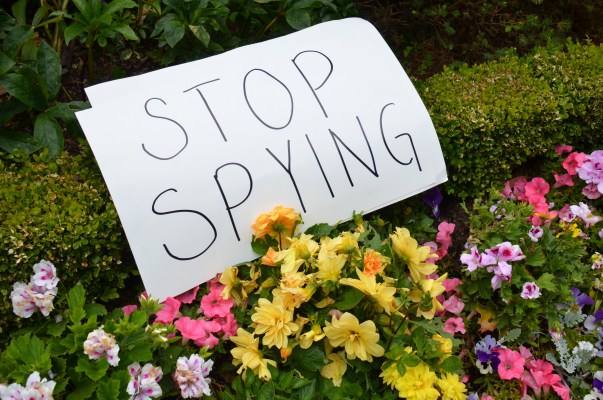After two years of roadblocks in reforming the National Security Agency programs revealed by Edward Snowden, it seems the viral John Oliver segment and impending program deadline are breathing new life into a reform movement that has seemed stagnant since late last year.
Privacy advocates experienced a major setback in November when a surveillance reform bill, the FREEDOM Act, died in a Senate procedural vote. But now they’re back, and with a new, simple question for Americans — Can they see your junk?
Playing off Oliver’s hilarious skit, one privacy activist built cantheyseemydick.com, which breaks down how each NSA program could be used to access private communications. Despite its flippant tone, the website offers simple explanations of complex programs that are difficult to understand.
On a more serious note, a new coalition of privacy groups led by the Electronic Frontier Foundation (EFF) today launched the Fight 215 campaign calling for an end to the NSA’s bulk collection of Americans’ phone records.
EFF activist Nadia Kayyali told TechCrunch the organizations launched the campaign today because of the impending deadline, but they were very excited about the Last Week Tonight with John Oliver skit and the attention it has already brought to surveillance reform.
With this campaign, the privacy advocates have taken a direct stance, end the bulk collection of Americans’ telephone records.
The bulk telephone data collection exposed in the Verizon order was the first major leak from the Snowden documents that captured the public’s attention.
“This is the baseline for reform that the EFF and many other groups have been talking about,” Kayyali said. “It’s certainly not a comprehensive, but that’s what really started the public conversation so it makes sense for that to be the first program to go.”
If Congress does not act to reform or extend Section 215, the provision of the PATRIOT Act that the NSA used to authorize its bulk telephone metadata collection program, it will expire by June 1. The privacy groups are capitalizing on this impending deadline by encouraging voters to send emails and Tweets to their representatives in Congress.
Although the campaign was not launched in connection with the Oliver skit, it could be successful for the same reason — it’s accessible. The campaign simplifies the surveillance reform message in a way that is digestible to the public. Previously campaigns to reform the programs have failed due to their technical nature and focus on aspects of government surveillance are unfamiliar to many.
In addition to the EFF, the ACLU, Human Rights Watch, the Sunlight Foundation, Freedom Of The Press Foundation and a long list of other groups are sponsoring the campaign.
Even with the new public attention on surveillance reform, privacy advocates face an uphill battle in Congress. Although surveillance reform is an issue that does not fall squarely on party lines, reform efforts in the Democratic-controlled Senate last year were thwarted primarily by Republican votes. Now Republicans control both chambers of Congress.
As the June 1 deadline approaches, no one in Congress has laid out a comprehensive plan to address government surveillance this year. Kayyali attributes the lack of action on the Hill to uncertainty.
“I think a lot of people, including people who want to see good legislation passed, weren’t certain where to start from,” Kayyali said. “It’s hard to say what Congress is thinking.”
As members look to form that plan, Kayyali hopes the new campaign will send them a clear message.
